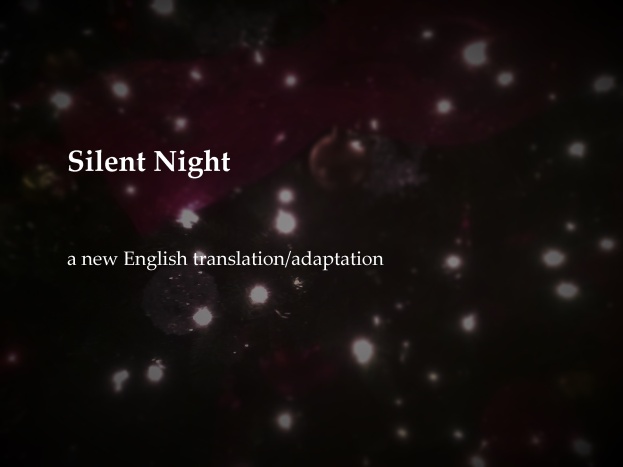“Silent Night” Turns 200: Non-Violent English-Language Translation/Adaptation Now Available article published

_____
“Silent Night” Turns 200: Non-Violent English-Language Translation/Adaptation Now Available
The famous Christmas hymn “Silent Night” (“Stille Nacht”) was first performed on the night of Dec 24-25, 1818. Joseph Mohr wrote the lyrics in 1816, and Franz Gruber set them to music in 1818 for the Christmas Mass of Oberndorf bei Salzburg, Austria. This song has endured ever since that time as one of the most universally recognized Christmas carols and hymns. “Silent Night” is one of the songs that was sung by opposing forces during the Christmas truce of 1914. This hymn has been declared a UNESCO cultural heritage piece and is one of the most highly recorded songs of all times.
Modern Christmas celebrants in general as well as vegan Christians who embrace non-violence in particular, however, reject a portion of the original text that includes a tacit recognition of animal exploitation, enslavement, and slaughter, namely, the phrase that includes a reference to “shepherds.” In order to bring the text into line with the spirit of kindness universally associated with the Christmas holiday and with the non-violence values particularly associated with original Christian teachings, a new English translation/adaptation—a “veganized” adaptation—is provided below.
This translation/adaptation is identical to the pre-existing English translation (mainly by John Young) except that the clause “Shepherds quake” has been replaced with “Stars awake.” This replacement has the virtue of (i) eliminating the animal-abuse text while (ii) retaining the original meter and “-ake” sound of the well-known English-language translation and (iii) also tying into the rest of the second verse more effectively, since the remainder of this verse pertains to sky-related concepts or symbols (e.g., “heaven” and “heavenly”). Retaining the poetics of a line is an essential task of veganizing a classic work.
Please feel free to use this text henceforth in your Christmas celebrations!
___
Silent Night
Lyrics: Joseph Mohr; Music: Franz Gruber; English translation: John Yong; English adaptation: S. E. Harrison
1. Silent night, holy night,
all is calm, all is bright
round yon virgin
mother and child.
Holy infant, so tender and mild,
sleep in heavenly peace,
sleep in heavenly peace.
2. Silent night, holy night,
stars awake at the sight;
glories stream from heaven afar,
heavenly hosts sing Alleluia!
Christ the Savior is born,
Christ the Savior is born!
3. Silent night, holy night,
Son of God, love’s pure light;
radiant beams from thy holy face
with the dawn of redeeming grace,
Jesus, Lord, at thy birth,
Jesus, Lord, at thy birth.
4. Silent night, holy night,
wondrous star, lend thy light;
with the angels let us sing,
Alleluia to our King;
Christ the Savior is born,
Christ the Savior is born!
___